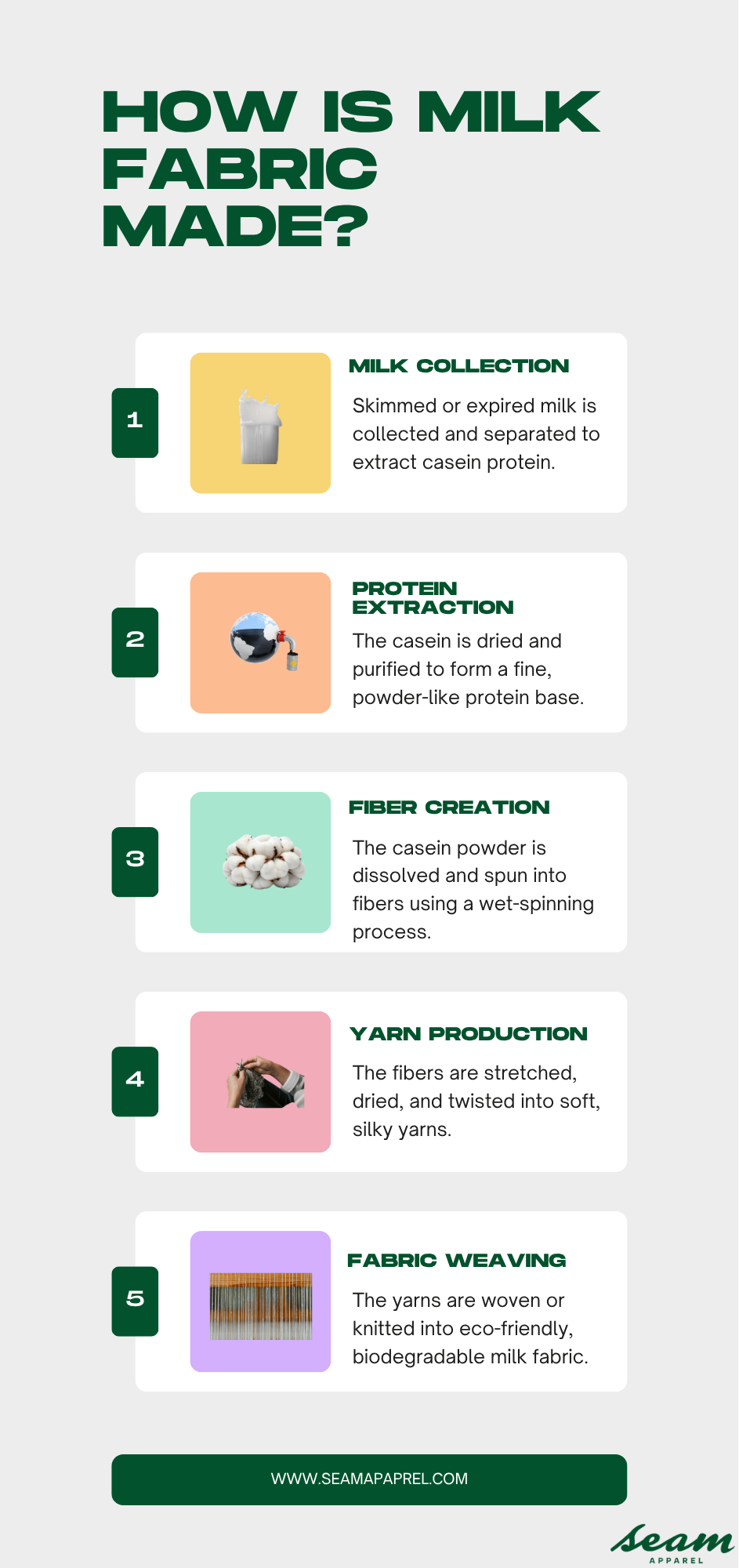What Is Crepe Fabric? Properties, How It’s Made & Where It Comes From
Crepe fabric is one of the most loved textiles in modern fashion....
As sustainability takes center stage in the U.S. fashion industry, innovative materials are no longer optional; they’re imperative. One such material gaining significant attention is milk fabric, a bio-based textile made from casein protein extracted from milk waste. A recent study estimates that over 2 million tons of milk are wasted globally each year, opening up massive potential for converting this byproduct into valuable regenerated protein fibers.
Neutral and credible institutions are driving the innovation. The Milk Fiber project in the Azores focuses on extracting casein from non-food milk to create fibers for textiles, health, and food sectors. Organizations such as the American Association of Textile Chemists and Colorists (AATCC) provide standards and testing protocols that help validate the quality and sustainability claims of new fabrics.
As sustainable fashion brands and eco-conscious apparel startups increasingly seek textile alternatives, casein-based milk fabric presents a compelling option. Seam Apparel, acting as a partner with deep sourcing and manufacturing expertise, is uniquely positioned to guide brands in navigating this emerging material, from scientific credibility to product realization.
Milk fabric is a bio-based textile created from casein, the protein extracted from sour milk. First invented in the 1930s, it was used as a silk substitute during times of textile shortages. While it faded from popularity, it has been revived in recent years as fashion shifts toward sustainable fabrics.
Other common names include:
Today, with sustainability and innovation driving consumer preferences in the USA. Milk fabric has re-emerged as a premium option for eco-conscious apparel brands and private label manufacturers like Seam Apparel.
The process of making casein fiber fabric combines biotechnology with textile manufacturing.

The production steps are:
There are two approaches:
This controlled process ensures milk fabric maintains a high-quality, silk-like feel while aligning with eco-friendly textile production practices.
| Fabric Type | Origin | Key Properties | Best For |
|---|---|---|---|
| Cotton | Natural | Breathable, soft | T-shirts, casualwear |
| Polyester | Synthetic | Durable, wrinkle-resistant | Sportswear |
| Silk | Natural | Luxurious, shiny | Formalwear |
| Linen | Natural | Lightweight, airy | Summer clothing |
| Denim | Cotton-based | Strong, structured | Jeans, jackets |
| Spandex (Lycra) | Synthetic | Stretchable | Activewear, leggings |
| Wool | Natural | Warm, soft | Sweaters, coats |
| Rayon/Viscose | Semi-synthetic | Smooth, breathable | Blouses, dresses |
| Fleece | Synthetic | Warm, lightweight | Hoodies, outerwear |
| Satin | Weave type | Glossy, elegant | Lingerie, eveningwear |
Scientific research confirms that casein fiber offers outstanding benefits: superior moisture transmission, antibacterial properties, and a luxurious texture that rivals silk while reducing environmental burden.
luxury For U.S.-based apparel startups, sustainable fashion brands, and private labels, milk protein fabric offers unique advantages:
This blend of performance and storytelling makes milk fabric a powerful choice for brands looking to stand out in a crowded market.
While promising, casein fiber fabric has challenges that brands should consider:
For startups and small brands in the USA, working with experienced manufacturers like Seam Apparel helps overcome these limitations through strategic sourcing.
Milk fabric is versatile and fits well into both premium and everyday categories:
This adaptability makes it an attractive option for eco-conscious fashion brands in the U.S. market.
The growth of sustainable fashion in the USA has pushed innovation in materials.
Milk silk fabric fits seamlessly into this movement because it:
By adopting milk fabric, brands not only meet consumer demand but also strengthen their position as innovators in sustainable fashion.
Read more about Eco-friendly materials for clothing in our blog: Eco-Friendly Materials for Clothing: A Sustainable Fashion Guide
Seam Apparel helps U.S. fashion startups, private labels, and sustainable brands bring their vision to life with access to innovative fabrics like casein fiber fabric.
Seam Apparel offers:
By partnering with Seam Apparel, brands gain a reliable manufacturing partner that understands both innovation and market demand in the U.S. apparel industry.
As sustainability reshapes the global fashion market, milk fabric stands out as an innovative material that blends science, luxury, and eco-consciousness. For U.S.-based fashion brands and startups, it offers a compelling opportunity to introduce unique, sustainable products.
Seam Apparel invites fashion businesses to explore casein-based milk fabric as part of their next eco-friendly collection. By sourcing and manufacturing with Seam Apparel, brands can confidently create garments that align with consumer demand for sustainability while standing out with innovation.
Contact us today to support environment friendly business.